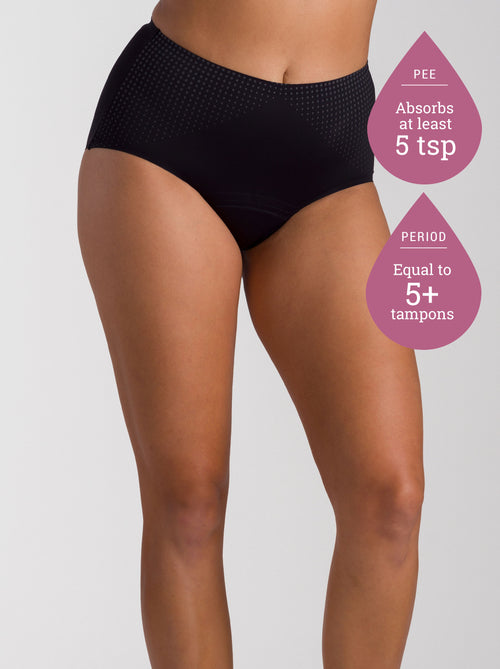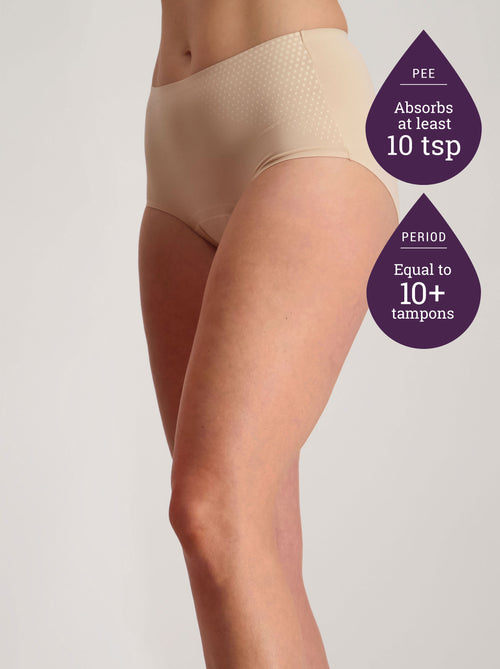Women who experience incontinence when coughing may feel embarrassed, anxious, and unsure about the causes — but there’s no need to suffer through this condition alone. We will break down the causes of coughing incontinence, and discuss the different solutions that are available. So, if you’re looking for peace of mind and an improved quality of life, keep on reading!
Why Do I Pee When I Cough?
Why Do I Pee When I Cough?
Is it Normal to Pee When You Cough?
It can be quite alarming to experience urination when coughing, but the truth is that it’s quite common. This condition, called stress urinary incontinence (SUI), can be triggered by everyday activities like coughing, sneezing, laughing or lifting heavy objects. We can’t always predict when it will happen, so let’s dig deeper into the causes of SUI and how to treat it.
What Causes Peeing While Coughing?
Put simply, SUI refers to the accidental leakage of urine when pressure is placed on the bladder. The reason it happens is that the muscles that support the bladder and urinary tract are weakened, making it harder for them to control urine flow. Common risk factors for SUI include:
- Genetic predisposition
- Diabetes
- Certain medications
- Spinal cord injuries
- Weight gain
- Aging
- Pregnancy
- Surgery in the pelvic region
Although SUI is a benign condition that is not usually a sign of a serious health issue, it can be embarrassing and uncomfortable for those who experience it. Fortunately, there are several options to manage urine leakage when coughing, including physical therapy, lifestyle changes and leakproof underwear.
How to Stop Urine Leakage When Coughing
Pelvic Floor Exercises
These exercises work to strengthen the muscles that support the bladder and rectum, ultimately leading to improved bladder control. Many women experience issues with pelvic floor muscles as they age, but with consistent exercise, these muscles can become stronger and more resilient. Some popular options include kegels, squats and bridges.
Kegels, in particular, involve contracting and holding the pelvic floor muscles for a few seconds at a time and can be done discreetly throughout the day. Working with a physical therapist or urologist can also help you develop a personalised pelvic floor exercise plan tailored to your specific needs. With patience and consistency, pelvic floor exercises can be an effective way for women to improve their overall health and say goodbye to peeing while coughing.
Create a Bathroom Routine
Creating a bathroom schedule can help train your bladder to release urine at regular intervals (roughly every two to three hours). This simple practice will help reduce unexpected leaks between bathroom breaks.
Other Lifestyle Changes
Just as obesity is a contributing factor to SUI, weight loss is a potential solution. Losing weight can help reduce occurrences of incontinence by taking pressure off the bladder. In addition to weight loss, limiting your consumption of diuretics like caffeine and alcohol will reduce the urge to urinate throughout the day.
Stay Dry With Leakproof Underwear
Wearing reusable incontinence underwear can help manage anxiety caused by SUI. If you experience light-to-moderate stress incontinence when coughing, laughing or exercising, Just’nCase by Confitex has options to help you.
Incontinence Underwear for Women
Just’nCase Full Briefs with Everyday Absorbency are perfect for mild bladder leaks and can absorb at least five teaspoons of liquid. Our customers find that they provide peace of mind for activities like hiking or even just sneezing. Our Full Briefs with Extra Absorbency offer added protection for light-to-moderate bladder leakage, with the ability to absorb at least ten teaspoons of liquid.
Not sure which Confitex product is right for you? Read our Absorbency Guide for more information.
When to Talk to a Doctor About Coughing Incontinence
If SUI continues to impact your day-to-day life and mental health, it’s important to talk to your doctor about more advanced treatments. A medical professional can help identify the underlying cause of the condition and provide more permanent treatment options.
Coughing Incontinence Treatments for Women
Electrical Stimulation
Electrical stimulation involves sending a mild electric current to the lower back nerves that are responsible for pelvic floor function. This works to improve communication between the brain and the bladder and reduce the risk of accidental leaks. While most electrical stimulation treatments are provided by doctors, the use of at-home units is becoming increasingly popular amongst women.
Vaginal Cones
Vaginal cones essentially provide weight training for women’s pelvic floor muscles. The weighted cones are inserted into the vagina and held in place by the pelvic floor muscles for 10–20 minutes at a time. Over time, the weights are increased to gradually strengthen the pelvic floor muscles and reduce bladder leakage.
Biofeedback
Biofeedback helps women improve their technique when doing pelvic floor exercises. It can be difficult for women to determine when they’re exercising their abdominal muscles as opposed to their pelvic floor muscles, so biofeedback devices help provide a visual representation of muscle activity to ensure the exercises are being done correctly. There are many biofeedback tools available, ranging from electrodes that are placed inside the vagina to monitor muscle activity, to external “stick-on” sensors. With the feedback from these devices, women can ensure they’re improving their pelvic floor strength to help address SUI.
Whether you experience mild or moderate stress urinary incontinence, there is a wide range of options that can help you stop peeing while coughing. Confitex’s leakproof underwear provides a reliable barrier against urinary leakage to help give you confidence and peace of mind in any situation. Don’t wait — browse our range of incontinence underwear for women to take back control of your life today!
The information provided in this article is for educational purposes only, and is not a substitute for professional medical advice. Every person’s circumstances are different, so consult your doctor for advice.
you may like
-

EVERYDAY ABSORBENCY
Comfy absorbent women’s briefs designed for mild bladder leaks and light-to-moderate period days.Shop now -

EXTRA ABSORBENCY
This multi-tasking washable pee-proof and period-proof underwear in Extra Absorbency for moderate bladder leaks and heavy periods.Shop now -

EXTRA ABSORBENCY
This multi-tasking washable pee-proof and period-proof underwear in Extra Absorbency for moderate bladder leaks and heavy periods.Shop now




